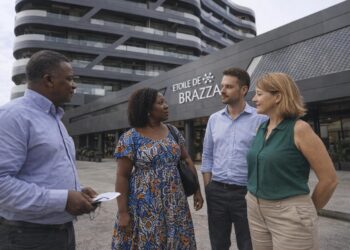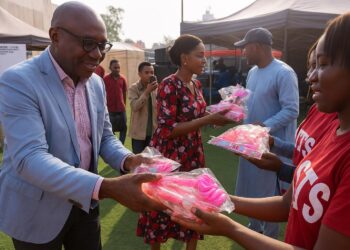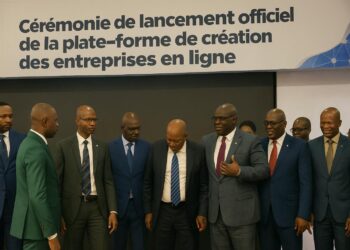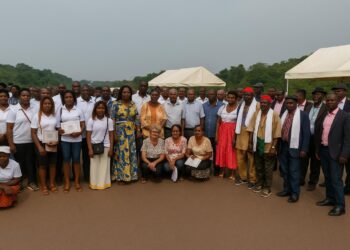Strategic IFC–BOA Congo Loan Ratified
The International Finance Corporation has extended a senior loan of CFAF 14.5 billion, roughly US$25.5 million, to Bank of Africa Congo. Structured under the IDA Private Sector Window’s local-currency facility, the deal represents IFC’s first financial-sector investment in Congo-Brazzaville since 2016.
Denominated in the regional franc, the financing gives BOA Congo longer tenors and predictable pricing in a market where private credit equals just 13.8 percent of GDP. At least a tenth of the envelope is ring-fenced for firms owned or steered by women.
SME Credit Gap in Congo-Brazzaville
Micro, small and medium enterprises provide most non-oil employment in Congo yet nearly two-thirds cite finance as their principal obstacle, according to the MSME Finance Gap report. Lengthy procedures, limited collateral and scarce financial statements keep many potential borrowers informally banked or entirely excluded.
Credit scarcity also curbs diversification targets pursued under the National Development Plan 2022-2026, which prioritises agro-industry, logistics and digital services. By delivering local-currency resources through a commercial intermediary, the IFC instrument aligns with public efforts to deepen the banking system without stretching sovereign balance-sheet space.
Women Entrepreneurs at the Forefront
Women remain under-represented in formal finance: only 44 percent of Congolese women above fifteen hold a bank account, versus 51 percent of men, and a mere nine percent access loans. By earmarking capital for female-led firms, BOA Congo intends to chip away at this persistent gap.
IFC officials stress that inclusive lending is not philanthropy but sound risk management. Historical data show female clients default less frequently in comparable segments. The institution therefore considers gender-smart banking a lever to both expand portfolios and improve asset quality for Congolese intermediaries.
Projected Jobs and Value-Chain Effects
Under conservative scenarios, the facility could reach more than 3,000 small businesses within five years. IFC modelling suggests the additional liquidity will directly create around 500 positions inside beneficiary firms and catalyse 800 indirect jobs across suppliers, distributors and service providers.
Beyond headcounts, improved cash-flow enables enterprises to invest in quality certification, digital bookkeeping and staff training that raise productivity. Over time, such step-ups may enhance tax revenues and broaden the formal sector, reinforcing the government’s agenda of sustainable, private-sector-led growth.
Risk Governance and ESG Alignment
In parallel with the loan, IFC will deliver advisory services to upgrade BOA Congo’s credit-risk governance. Modules cover segmentation, cash-flow analysis and early-warning triggers, all calibrated to regional Central Bank of Central African States regulations.
The bank will also adopt an Environmental and Social Management System consistent with IFC Performance Standards, embedding checks on waste, labour and community impact. Stronger ESG compliance not only mitigates reputational exposure but should ease future syndications as global investors tighten due-diligence demands.
Complementarity with National Reform Drive
The operation dovetails with fiscal consolidation and public-sector reforms already praised by multilateral partners. By steering development finance through a private bank, authorities avoid contingent liabilities while signalling support for market-based allocation of resources.
Officials consider the transaction a pilot for future blended-finance structures that could target priority sectors such as renewable energy or agribusiness storage. Successful disbursement and repayment would furnish a local benchmark, encouraging other lenders to extend tenors beyond the prevailing two-to-three-year horizon.
Signals for Lenders and Investors
For commercial banks, the IFC seal of approval reduces perception of country risk and showcases the profitability of SME books when supported by robust analytics. Rating agencies often credit such partnerships in their assessments, potentially lowering future funding costs for the sector.
Institutional investors monitoring Central Africa’s fixed-income space view local-currency issuance as a hedge against exchange volatility. The new facility therefore sends a reassuring message that depth and tenor can gradually improve, provided prudential ratios and transparency continue progressing.
Continuing Pipeline of Private Projects
IFC recently inaugurated its Brazzaville office and now reports an active Congolese portfolio approaching US$100 million, spanning renewable power, digital infrastructure and logistics. Flagship programmes such as Mission 300 and the Local Champions Initiative indicate further opportunities for co-investment with domestic institutions.
Against that backdrop, the BOA Congo transaction acts as both proof of concept and stepping stone. By marrying concessional risk-sharing with commercial discipline, the model aspires to unlock broader pools of domestic savings, animating a resilient, inclusive and diversified Congolese economy.
Opportunities for Diaspora
Members of the Congolese diaspora often cite limited on-the-ground financial networks as a barrier to repatriating capital or expertise. Expanded SME lending platforms can provide vetted pipelines into which overseas savings flow, while strengthening corporate governance standards familiar to international professionals.
Regulatory dialogue around fintech, mobile money and credit bureaus is accelerating, and observers expect complementary measures to be announced within the next budget cycle. Faster data sharing would sharpen risk pricing, further lowering borrowing costs and amplifying the impact of the IFC-BOA Congo framework.












































